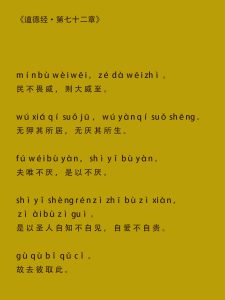Tao Te Ching Chapter 72: Governing with Reverence

Original Chinese Text
民不畏威,则大威至。
无狎其所居,无厌其所生。
夫唯不厌,是以不厌。
是以圣人自知不自见,
自爱不自贵。
故去彼取此。
Pinyin (Pronunciation)
Mín bù wèi wēi, zé dà wēi zhì.
Wú xiá qí suǒ jū, wú yàn qí suǒ shēng.
Fú wéi bù yàn, shì yǐ bù yàn.
Shì yǐ shèngrén zì zhī bù zì xiàn,
Zì ài bù zì guì.
Gù qù bǐ qǔ cǐ.
Structured Translation & Interpretation
Power Dynamics Framework
| Condition | Consequence | Governance Principle |
|---|---|---|
| 民不畏威 | 大威至 (Great threat emerges) | Fear-based rule backfires |
| 无狎其所居 | Social stability | Respect living spaces |
| 无厌其所生 | Economic harmony | Sustain livelihoods |
Sage’s Self-Governance
- 自知不自见 → “Self-aware without self-display” (Authentic leadership)
- 自爱不自贵 → “Self-respecting without self-importance” (Ego management)
Plain English Paraphrase
Part 1: The Paradox of Power
- “When people stop fearing authority, true crisis begins” → Modern protest movements
- Solution:
- Don’t constrain homes (Housing policy implication)
- Don’t suffocate livelihoods (Basic income debate)
Part 2: The Leader’s Mirror
- “Know yourself deeply, but don’t perform yourself” → Contrast: social media leaders vs. true statesmen
- “Value yourself truly, but don’t elevate yourself” → Mandela vs. dictators
Part 3: The Choice
- Reject: Oppression (彼)
- Embrace: Reverent governance (此)
Key Philosophical Terms
| Chinese | Literal Translation | Political Science Equivalent |
|---|---|---|
| 大威 | “Great threat” | Revolution risk |
| 不厌 | “Not oppressive” | Social contract stability |
| 自爱 | “Self-love” | Healthy narcissism |
Modern Applications
For Policymaking
- “High housing costs (狎居) create social unrest” → Hong Kong protests case study
- “Living wage policies prevent 大威” → Scandinavian models
For Corporate Leadership
- “CEO humility (不自贵) increases employee loyalty” → Satya Nadella’s Microsoft
For Personal Development
- “Confidence without arrogance attracts trust” → 自知不自见 in interviews
“Like tending a garden—over-control kills growth, while mindful space brings abundance.”
— Governance metaphor for 不厌
Connections to Other Chapters
- Chapter 74: “When people don’t fear death…” → Escalation scenario
- Chapter 17: “Best leaders are barely known” → Complementary ideal
Would you like:
- Historical analysis of 大威 moments?
- Psychological research on authentic vs. performative leadership?
- Contrast with Machiavelli’s fear doctrine?

4 Comments